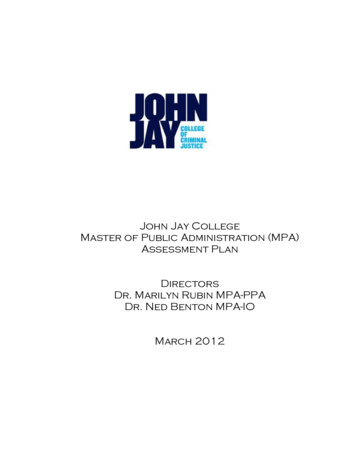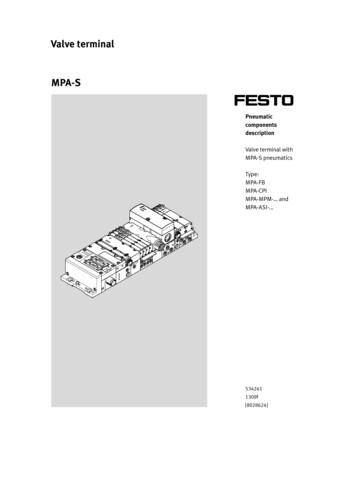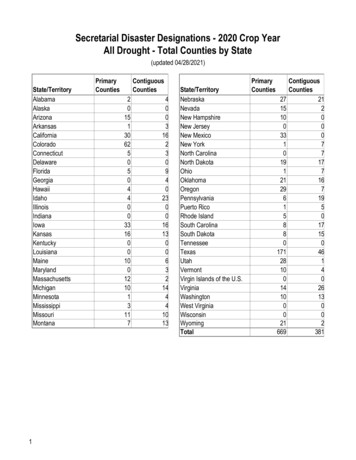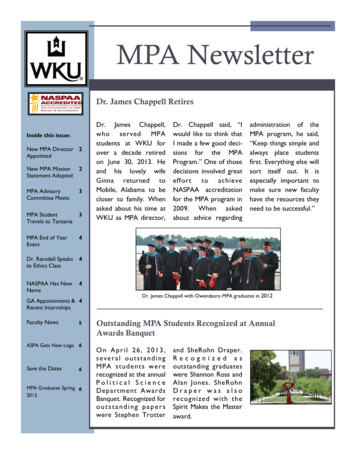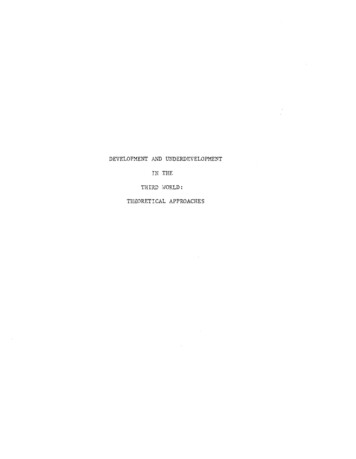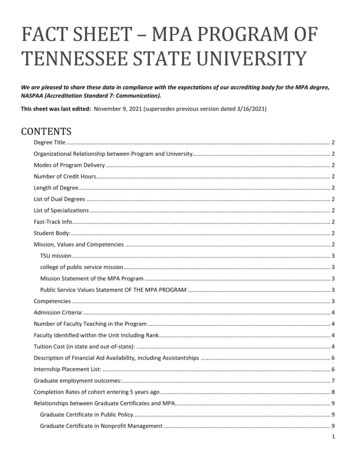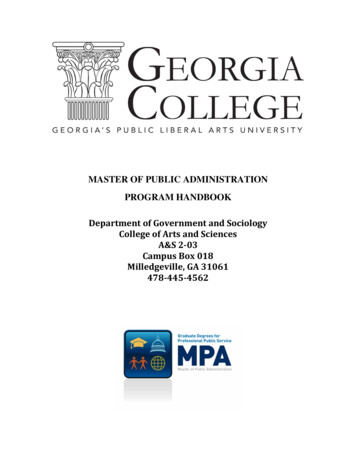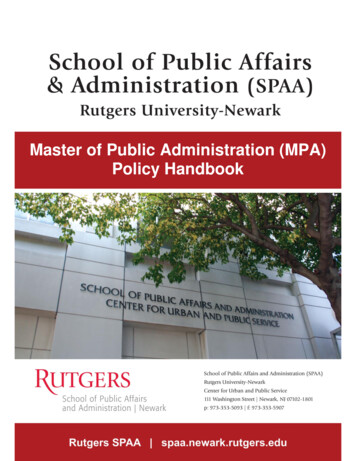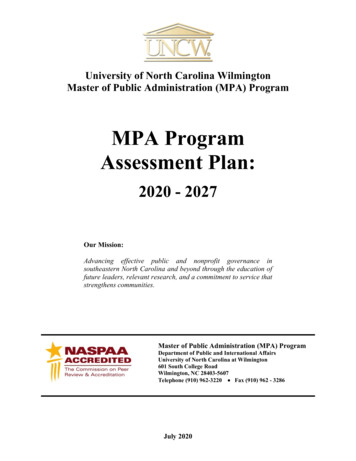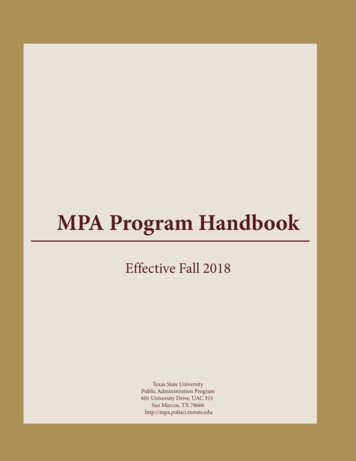
Transcription
MPA Program HandbookEffective Fall 2018Texas State UniversityPublic Administration Program601 University Drive, UAC 355San Marcos, TX 78666http://mpa.polisci.txstate.edu
TABLE OF CONTENTSMPA Program Information & Course OverviewProgram OverviewPurposeClassesClass LocationsProgram RequirementsDegree PlanCourse Work OverviewCore CoursesCareer Support AreasApplied Research Project (ARP)InternshipCourse of Study OutlineMPA CoursesLeveling CoursesCore CoursesMPA ElectivesAnalytical Tools and TechniquesHuman Resource ManagementAdministrative LawPublic PolicyNonprofit SectorOther Elective CoursesPrior Transfer Credit & Course SubstitutionsMPA Coursework ChecklistMPA InternshipCourse DescriptionCourse ObjectiveCourse RequirementsApplied Research ProjectDescriptionGuidelines for the ProspectusSubmission of the ARPMPA Course DescriptionsMPA Program FacultyStudent ResourcesStudent OrganizationsMPA Student Information WebpageHelpful LinksStudent PoliciesASPA Code of EthicsBoard of 0101011-1416-1719-20192020212223-2
MPA Program Information &Course Overview
1PROGRAM OVERVIEWPURPOSEThe MPA Program is divided into three major components. These components consist of coursework, theapplied research project, and a comprehensive oralexamination. Designed to prepare individuals forleadership and management positions, the MPAProgram can either get careers started or aid in careeradvancementMISSION STATEMENTThe MPA Program is designed to cultivatepractical, research- oriented students forcareers as reflective practitioners guidedby democratic values, integrity, and publicservice.The MPA degree enables students to develop professionalskills and take advantage of the many opportunities inthe public or non-profit sector. The challenges andrewards in government have never been greater thantoday. Whether an individual is interested in localgovernment administration, public finance, personnelmanagement, or policy analysis, the MPA Program atTexas State University can help meet current trainingand education needs, and fuel future aspirations.CLASSESClasses consist of 15-20 students and are scheduledwith the working student in mind. Students in the MPAProgram have varied academic backgrounds andinclude practitioners at all levels of government, activeduty military, private sector professionals, as well asstudents who have recently completed a baccalaureatedegree.Small classes allow students and instructors to havecontinuing opportunities to take advantage of thediversity represented in each course. Courses meet onenight per week from 6:30 pm to 9:20 pm in the fall andspring semesters and from 6:30 to 10:15 pm in thesummer sessions. Courses are offered on the maincampus in San Marcos and the Round Rock campus.The Texas State Master of Public Administration (MPA) Program wasoriginally accredited in 1988 by the National Association of Schools of PublicAffairs and Administration (NASPAA) and has been re-accredited through
2September 2023.2
1CLASS LOCATIONSMain CampusThe Undergraduate Academic Center (UAC)building is located on the main campus in SanMarcos, Texas. The Undergraduate(Undergraduate) Academic Center is the homeof the Public Administration Program (UAC355). Accessible parking is located at the LBJStudent Center and Edward Gary Street Pay-toPark Garages.For more about commuter parking ingInformation/Student.htmlTexas State UniversityRound Rock CampusTexas State University’s Round Rockcampus is located on 101-acres onUniversity Blvd. in northeast RoundRock between I-35 and Highway 130,just off SH 1460. For moreinformation visit:http://www.rrc.txstate.edu3
4PROGRAM REQUIREMENTSDEGREE PLANCOURSE WORK OVERVIEW“Degree Works” is the online degree audit programused by Texas State University to assist students andadvisors in reviewing their progress towards the degree.Degree Works organizes courses to easily identifycourses completed and courses still needed to fulfilldegree requirements. The degree audit is to be used bythe student to determine which courses to select foreach semester’s registration. For information on how toaccess Degree Works” see:Masters of Public Administration course work consistsof required core courses and electives.CORE COURSESThe MPA core consists of 30 hours of publicadministration courses. Courses range across manydifferent areas in public administration andmanagement (public finance, organization theory,public personnel administration research methods,and public law. For a comprehensive listing of coursesand course descriptions see pages kDW.pdfAny degree audit change request should be completedprior to the student’s registering for a course that is notincluded in the degree outline. Any courses takenwithout an approved degree outline change request istaken at the student’s own risk and may not counttoward the degree.Did You Know?COURSE OF COMPLETIONThe course of study for the MPA degree must becompleted within six years of the date of initialenrollment in the program. In certain cases, awaiver of the time lime for degree completion maybe granted. Students should submit their requestfor a waiver to the director of the MPA Program.4
1PROGRAM REQUIREMENTS, cont.APPLIED RESEARCHPROJECT (ARP)In addition to course work, students will be expected tocomplete a major research paper under the guidance ofa professor supervising their work prior to completionof the MPA Program.MPA students are eligible to enroll in PA 5398(Applied Research Project) after the completion of 3336 hours of the MPA degree program. Detailedinformation on the ARP is provided on page 11.INTERNSHIPThe internship is primarily designed to providepractical experience to pre-service students. Theacademic component consists of part-timeemployment in a public service entity or governmentrelated office. An internship is required for all preservice students but is optional for practitioners.Did You Know?In-Service v. Pre-ServiceStudents who have previously been or are currentlyemployed in the public sector are classified as inservice.Students who have no public-sector experience areclassified as pre-service.Evaluation of the ProgramEvaluation of courses by students in the MPAProgram is both desired and solicited. Prior to theclose of each semester a MPA course evaluationform will be submitted to each student enrolled ina MPA course. On this form the student isencouraged to analyze and describe strengths andweaknesses of MPA courses, instructors, andprocedures.Every effort will be made to respond to studentcritiques. As a final step of the Applied ResearchProject process, students are asked to participatein an “exit review” which provides an opportunityfor discussion of areas of program strengths andweaknesses and suggestions for improvement.522
6COURSE OF STUDY OUTLINEMPA ElectivesDid You Know?ANALYTICAL TOOLS AND TECHNIQUESIt is advised that PA 5300 betaken within the first 12 hours ofcourse work. MPA COURSES LEVELING COURSES PA 5389 Internship in GovernmentHUMAN RESOURCE MANAGEMENTCORE COURSES PA 5311 Introduction to Statistical AnalysisPA 5312 Program Evaluation & AdvancedStatistical AnalysisPA 5313 Public Sector EconomicsPA 5314 Public Administration & InformationTechnologyPA 5315 Public Performance Management PA 5300 Introduction to Public Policy andAdministrationPA 5310 Public Finance AdministrationPA 5320 Organization Theory, Change& BehaviorPA 5330 Public Personnel AdministrationPA 5340 Public LawPA 5350 Public Policy ProcessesPA 5370 Public Management and EthicsPA 5390 Applied Research MethodologyPA 5397 Research Design & ProposalDevelopment for Public AdministrationPA 5398 Applied Research ProjectPA 5331 Labor Management RelationsPA 5332 Management Practices in PublicPersonnel AdministrationADMINISTRATIVE LAW PA 5352 Comparative Public AdministrationPA 5353 Ecology and the Politics ofSustainabilityPA 5355 Environmental Policy PA 5308A Texas Water Law & PolicyNONPROFIT SECTOR PA 5361 Introduction to the Nonprofit &Voluntary SectorPA 5362 Alternative Public Delivery SystemsOTHER ELECTIVE COURSESDo I Need to Take Statistics? Did you take undergraduate statistics andscored a “B” or higher? - NO Did you take undergraduate statistics andreceive a “C” or lower? - YES Has it been more than five years since you’vetaken a statistics course? - YES 6PA 5380 Topics in Public AdministrationPA 5388 Directed Readings and ResearchPA 5389 Internship in GovernmentPA5387 Research Practicum
1COURSE OF STUDY OUTLINE, cont.PRIOR COURSEWORK CREDITCOURSE SUBSTITUTIONSThe director of the MPA Program has theresponsibility of evaluating graduate courses taken atother universities to see if they can be applied towardthe MPA degree and making a recommendation to thedean of the Graduate College. As a rule, up to ninecredit hours may be transferred to Texas StateUniversity prior to admission to the graduate programprior to admission to the graduate program. **transfercredit may be accepted after admission.Under certain circumstances, students may be unableto take all the courses required by their degree outlineor may have a specific career need that is not met bythe required curriculum. In such cases, the MPAgraduate advisor may recommend a substitution ofcourses.To be eligible for transfer, these courses must havebeen taken while enrolled and accepted in agraduate program at the prior institution. Alltransfers are subject to the final approval of thedean of the Graduate College.Courses taken over six years prior to admission to theGraduate College normally cannot be transferred. Torequest transfer credit, a copy of the official transcriptand a copy of the catalog course description must beprovided to the director of the MPA Program.**Courses must meet grad college requirement gradeof “B” or better.Any degree outline change request must be completedprior to the student’s registering for the substitutioncourse. All recommended course substitutions must berequested in writing to the Graduate College in theform of a petition.The Dean of the Graduate College has the finalauthority to approve or disapprove coursesubstitutions. Any course taken without an approveddegree out- line change request is taken at thestudent’s own risk and may not count toward thedegree.MPA ADVISORY COUNCILThe MPA Advisory Council was created in January1989 and meets twice a year. It is composed ofalumni, practitioners at federal, state, and locallevels of government, and current students. TheCouncil and program faculty serve as an advisorybody for program activities including, but notlimited to, the following: Curriculum Development Program Improvement Networking for Program Graduates Assistance with New Student Orientation Career Development722
8MPA COURSEWORK CHEKLISTLEVELING COURSE REQUIREMENTS (IF APPLICABLE)SEMESTERCOURSETITLEPA 5389Internship in DECORE COURSE REQUIREMENTS (30 HRS. TOTAL)SEMESTERCOURSETITLEPA 5300Introduction to Public Policy and AdministrationPA 5310Public Finance AdministrationPA 5320Organization Theory, Change & BehaviorPA 5330Public Personnel AdministrationPA 5340Public LawPA 5350Public Policy ProcessesPA 5370Public Management and EthicsPA 5390Applied Research MethodologyPA 5397Research Design & Proposal Development forPublic AdministrationPA 5398Applied Research ProjectELECTIVES (9 HRS. TOTAL)**SEMESTERCOURSETITLE**Please Note: PA 5311 Course will become a required elective for students without a proper background instatistics.**8
1COURSE DESCRIPTIONThe MPA Internship is primarily designed to providepractical on-the-job experience to pre-service students. Theacademic component consists of part-time (paid or unpaid)on- the-job experience in a government-related office or anon-profit organization.Ideally, the internship experience provides professionalexperience, and an opportunity to integrate theorieslearned in the classroom with practical experience. Inaddition, the student is exposed to the daily routines,processes, procedures, and expectations of work life in thepublic sector.COURSE OBJECTIVESThe internship is a structured educational work experience, where students take a responsible role and contribute to a public administration organization. Throughthe internship, the student should learn new skills,expand their knowledge of a particular management ofpolicy area, explore career options, and apply academ- icknowledge in a “real- life” situation. The internshipshould also facilitate the development of professionalskills such as planning, organizing and leadership.Did You Know?Internships can be very useful forindividuals wishing to make acareer change.Page 9Internship PlacementsThe following are examples of internshipssecured by MPA students. City of San Marcos, City Managers Office Attorney Generals Office, FamilyInitiatives City of Austin, Communications & PublicInformation Office Central Texas Medical Hospital Texas Department of Public Safety, Auditors Office Texas Veterans Commission Texas General Land Office Texas Commission on EnvironmentalQuality Haven for Hope
10COURSE REQUIREMENTSDid You Know?Students must meet with internship coordinator Dr.Howard Balanoff to register for PA 5389.INTERNSHIP WAIVERNUMBER OF HOURSThe student is expected to work a total of 300 hours overthe course of the internship. This usually averages to 20hours a week for 15 weeks. The student should documentthe hours worked in the Internship Manual. Studentsshould also keep a daily journal.In order for the internship requirement to be waived, aletter from an employer or past employer brieflydocumenting the student’s administrative experienceneeds to be sent to the director of the MPA Program.FORMS ON FILEThe student must complete the required paperworkthat is found in the Internship Manual. The studentshould maintain a copy of the signed forms in themanual and provide a copy to the director of the MPAProgram. All required forms can be found NGSOver the course of the internship the student shouldhave two meetings with the director of the MPAProgram (one may be over the phone) and send weeklyemails detailing progress in the internship. Documentthe meetings and keep all email communication in theInternship Manual.RESEARCH PAPER10 – 15 Page paper on a management or policy arearelated to the internship.Where to Find InternshipsINTERNSHIP MANUALAll materials collected in the Internship Manualshould be turned in at the end of the internship.10 Department of Political Science MPA Students Webpage Jobs4Cats Texas State Career Fairs The Texas Politics Project 501 (c)community City of Austin City of San Antonio
1APPLIED RESEARCH PROJECTDESCRIPTIONSubmission of the ARPThe Applied Research Project (ARP) is completed overtwo courses. In PA 5397, students review the literatureand develop a conceptual framework around a specificresearch purpose.After successful completion of PA 5397 with a B orbetter, the student turns in a prospectus and is grantedpermission to enroll in PA 5398For both courses, the student and the professor willmeet at hours to be arranged. The following facultymembers currently teach PA 5397 and PA 5398 Professors will establish their own deadlines andprocedures for submission of ARP at the beginning ofeach semester. As a general rule, students should beprepared to turn in their paper in final form by the lastday of classes for that semester. If a student fails toturn in an acceptable first draft of the paper, he/ shewill be advised to drop the course and re-registerthe following semester. Failure to drop by the requireddeadline could result in an “F” for the course.Three copies of the final draft should be prepared forthe committee review. If the student submits anacceptable first draft but fails to complete an approvedfinal draft before the established end-of-the-semesterdeadline, the student may receive a grade of “I” for thecourse. Students must complete the applied researchproject in 12 months or the “I” grade will revert to anautomatic “F.”Nandhini Rangarajan nr11@txstate.eduPatricia Shields ps07@txstate.eduHassan Tajalli tajalli@txstate.eduContact the professor for more information aboutmeeting times and deadlines.The Applied Research Project (ARP) requires thereview and signature of two committee members.The committee is assigned during the semester thestudent is enrolled.Before EnrollingBefore enrolling in PA 5398, the student should havecompleted 33 to 36 hours of MPA coursework,including both PA 5390 and PA 5397. Theprospectus should be submitted to the facultymember who you plan to work with to complete theARP.Professors will establish their own individual qualitystandards for research papers. All ARPs, regardless ofapproach and individual standards will contain thefollowing: a research purpose statement, a conceptualframework table, an extensive bibliography, appropriatecitations, and formatted according to The ChicagoManual of Style, 15th edition.The student must turn in one copy of the paper in finalform to the supervising professor. Upon approval of thepaper, the professor will assign a letter grade tothe student. The student will t h e n submit oneelectronic copy to the MPA program. If the studentwishes, and the faculty member agrees, the ARP can beplaced online with the Texas State institutionalrepository also known as digital collections. Papersplaced in the digital collections are searchable and thiswill increase the visibility of your work. To view ibrary.txstate.edu/handle/10877/105.Page 11
12MPA Course Descriptions12
1COURSE DESCRIPTIONSBACKGROUND COURSESPA 5311 Introduction to Statistical Analysis (Elective Course)This course applies quantitative methods to problems faced by public administration practitioners. Topics include the use ofdescriptive and inferential statistics as they apply to decision making in public management. Students gain hands-on experiencewith data collection, analysis, and interpretation. **Students who do not have a statistics class in prior coursework with a “B” orbetter within the last 5 years are required to take PA 5311 as part of their 9 hour electives.PA 5389 Internship in Government (Background Requirement)This course provides students with the opportunity to integrate classroom learning with practical experience. Students withlittle or no work experience related to public service are required to complete an internship. Stu- dents considering a careerchange should consider an internship. May be repeated once for additional credit.CORE COURSESPA 5300 Introduction to Public Policy and AdministrationThis course introduces students to the study and practice of US public administration and policy. It also focuses on the dynamicsof the democratic governance process.PA 5310 Public Finance AdministrationThe course examines the applied aspects of public finance including operating budgets, revenue estimation, capital budgeting,financial planning, budgetary decision-making, cost-benefit analysis, and life-cycle costing. In addition, strategies for budgetjustification, presentation, and implementation are examined. The use of various budgetary tools and techniques are emphasized.PA 5320 Organization Theory, Change, and BehaviorThis course analyses classic and contemporary literature on organizational theory and behavior in the public sector. Emphasisis placed on history and development of organizational theory and core concepts such as organizational culture, power, andchange. The implications of organizational theory for democratic governance are explored.PA 5330 Public Personnel AdministrationThis course introduces students to public personnel functions from a managerial perspective. Examples of topics covered include:recruitment and selection, performance evaluation, discipline, collective bargaining, classification, and compensation. Topicsinclude constructive leadership of government personnel that encourages a more competent, motivated, and representativeadministrative workforce.PA 5340 Introduction to Public LawThis course examines the regulatory environment, legal requirements, and constraints that public officials face when carrying outtheir duties. The use of on-line research tools to find administrative materials and analyze public law issues is emphasized.PA 5350 Public Policy ProcessesThis course is an overview of the process of public policymaking including policy formulation and implementation. An emphasisis placed on actors in the policy process and the political environment.
18COURSE DESCRIPTIONSPA 5370 Public Management and EthicsThis course explores issues of morality and ethics in the public sector. It also considers subjects such asadministrative discretion, the public interest, democratic values, and dissent. The course aims toformulate a frame of reference for judging behavior and clarifying our role and responsibility as moralagents.PA 5390 Applied Research MethodologyThis course is an introduction to applied research methods in the public sector. Topics include thescientific method, research design, measurement, qualitative research, and sampling. Data collectionmethods such as survey research, content analysis, and secondary data analysis are also covered.PA 5397 Research Design and Proposal Development for Public AdministrationThis course prepares students for the demands of academic and professional writing. Students learnhow to identify a public problem, develop a research purpose statement, and complete a literaturereview around a conceptual framework. This course prepares the student for their Applied ResearchProject (ARP). (Prerequisite: PA 5390 with a grade of "B" or higher and instructor permissionrequired).PA 5398 Applied Research ProjectThis course serves as the capstone experience for MPA students. Students must complete an originaland empirical Applied Research Project (ARP). Students must also complete an oral defense of theARP. Prerequisite: Grade of “B” or better in PA5397 and instructor permission.ELECTIVESPA 5312 Program Evaluation and Advanced Statistical AnalysisThis course is an advanced course in the application of quantitative methods for the evaluation ofpublic policies and programs. The course emphasizes the administrative and managerial environment.(Prerequisite: PA 5311 or a graduate level statistics course, with a grade of "B" or better)PA 5313 Public Sector EconomicsThis course presents basic concepts of economics as applied to the public sector. Principles ofeconomics for policy analysis and management are examined in the context of collective action, publicchoice, resource allocation, and service delivery. The course also examines the financing of national,state, and local governments.PA 5314 Public Administration and Information TechnologyThis course explores the use of information technology in the public sector. It emphasizes the issues18
1that public administrators need to know concerning the impact of information technology on theirorganizations. Thecourse covers E-Democracy, E-Governance, Enterprise Architecture, Public Management InformationSystems (PMIS), E-Procurement, and E- Commerce.
20COURSE DESCRIPTIONSPA 5315 Public Performance ManagementThis course examines public sector performance management and measurement as toolsfor improving strategic planning, resource allocation, organizational learning, andinternal operational processes. It also examines accountability, managerial performance,and evaluation processes.PA 5331 Labor Management RelationsThis course examines the historical development of public employee unions and the effectsof collective bargaining agreements on personnel policy development. Public lawsconcerning collective bargaining procedures and strategy on the part of public managers arecovered.PA 5332 Management Practices in Public Personnel AdministrationThis course examines selected topics in public personnel administration including jobanalysis, position classification, test construction, performance appraisal, successionplanning, and affirmative action. The role of the personnel office as a strategic partner inaccomplishing organizational goals is explored.PA 5351 Transportation PolicyThis course presents basic components of transportation policy and planning. In additionto building an under- standing of the historic foundation of transportation policy, studentsexplore the underlying concepts related to congestion management, transit and activetransportation planning, and impacts on land use and sustainability.PA 5352 Comparative Public AdministrationThis course considers differences in various national administrative systems and the roleof international organizations. It explores differences that influence various public policyissues from countries around the world. Policy issues examined include poverty, humanrights, health care, and the environment.PA 5353 Ecology and the Politics of ScarcityThis course is an exploration of problems and policies dealing with air, water, waste, energyuse, natural resources, sustainability, and global environmental issues. This class highlightsthe historical drivers of environmental policy. Implementation strategies, policymechanisms, and compliance adherence are also examined.20
1COURSE DESCRIPTIONSPA 5355 Environmental Policy, Politics, and LawThis course examines the formulation and implementation of environmental policy and law at the state,federal, and international level. It highlights legislation, rulemaking, treaties and international conventions.(This course will introduce students to the public policy process and the details of U.S. environmentalpolicy and administration. Problems and policies dealing with air, water, solid waste, hazardouswaste, energy use, natural resources, climate change, sustainability, and global environmentalgovernance will be discussed.)PA 5361 Introduction to the Nonprofit and Voluntary SectorThis course provides a foundation for understanding the history, scope, and function of the Americannonprofit and voluntary sector. It includes an examination of the conceptual and theoretical underpinningsof the sector, an assessment of the role of these organizations in society, and their impact on public policy.PA 5362 Alternative Public Service Delivery SystemsThis course examines alternative delivery of public services. The reliance on market mechanisms, contractingout, and privatization are explored.PA 5380 Topics in Public AdministrationThis course examines contemporary topics in public administration, policy, and management. May be repeatedonce with a different emphasis for additional credit.PA 5380A Texas Water Law & PolicyThis course examines the chief policy issue that will determine the future of Texas: how state and localagencies administer the state’s ground and surface water legal regimes. With the legal and regulatoryframework in place, the course investigates pressing water policy issues that confront Texas.PA 5387 Research PracticumThis course uses structured group research to analyze a current policy, management, or administrativeissue. A professor-led research team completes a final report detailing findings and recommendations foraction. The course may be repeated once for additional credit. Instruction permission is required.PA 5388 Directed Readings and ResearchThis course guides students in directed reading and research on various topics in public policy andadministration under the direction of a graduate faculty member. The course may be repeated once with adifferent emphasis for additional credit. Instructor permission is required.
22MPA Program Faculty22
1MPA PROGRAM FACULTYDr. Howard BalanoffProfessor, Department of Political ScienceDirector of the William P Hobby Center for Public ServiceOffice: UAC 376 Phone: 512.245.3453 Email: hb02@txstate.eduAreas of Interest: Personnel Administration, International and Comparative PublicPolicy and Administration, Organizational TheoryDr. Christopher BrownAssociate Professor, Department of Political ScienceOffice: UAC 345 Phone: 512.245.4404 Email: cb56@txstate.eduAreas of Interest: Environmental and Natural Resources Law, Administrative Law,Constitutional Law, Law Related to Public AdministrationDr. Billy FieldsAssistant Professor, Department of Political ScienceOffice: UAC 332 Phone: 512.245.7726 Email: wf16@txstate.eduAreas of Interest: Place Management, Hazard Mitigation, and SustainableTransportation PolicyDr. Emily HanksAssistant Professor, Department of Political ScienceOffice: UAC 348 Phone: 512.245.5608 Email: emily.hanks@txstate.eduAreas of Interest: The Nonprofit and Voluntary Sector, Public Values, AppliedCommunication, and Public AdministrationDr. Thomas LongoriaProfessor, Department of Political ScienceOffice: 359 Phone: 512.245.7582 Email: tl28@txstate.eduAreas of Interest: Local Government Politics and Administration, Non-profitManagementDr. Patricia ShieldsProfessor of Political ScienceOffice: UAC 352 Phone: 512.245.7582 Email: ps07@txstate.eduAreas of Interest: Civil Military Relations, Pragmatism of Public Administration
24Dr. Dianne RahmProfessor, Department of Political ScienceOffice: UAC 374 Phone: 512.245.1565 Email: dr37@txstate.eduAreas of Interest: Environmental Policy, Energy Policy, Science & TechnologyPolicy, Public Policy Formulation and Implementation, Public AdministrationDr. Nandhini RangarajanAssociate Professor, Department of Political Science(Director of the MPA Program)Office: UAC 351 Phone: 512.245.3285 Email: nr11@txstate.eduAreas of Interest: Public Management, Organizational CreativityDr. Hassan TajalliAssociate Professor, Department of Political ScienceOffice: UAC 377 Phone: 512.245.3284 Email: tajalli@txstate.eduAreas of Interest: Methodology,
The MPA Program is designed to cultivate practical, research- oriented students for careers as reflective practitioners guided by democratic values, integrity, and public service. The Texas State Master of Public Administration (MPA) Program was originally accredited in 1988 by the National Association of Schools of Public
